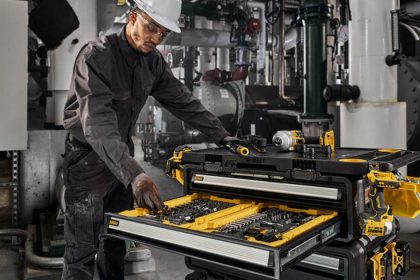The fan-favourite Grand Designs host says an unhealthy obsession with university education is causing many to turn away from the trades.
McCloud, who is visiting Australia for his televised speaking tour ‘Home Truths‘, dove into the similarities he saw between our struggling building industry and the UK’s on air with 2GB’s Michael McLaren yesterday afternoon.
Like Australia, the UK is staring down a major shortfall of tradies over the coming decade. As of 2023, the sector needed 166,000 more tradies to fill vacant positions across the country, with that number expected to jump to 250,000 by 2030.
In comparison, Aussie worksites will need to attract about 480,000 new tradies by the end of 2026 to build enough homes for our growing population, according to estimates from Master Builders Australia.
“…even main contractors and builders find it really hard to find really skilled labor these days. So to find great people is hard. And what we need is for our built environment to be crafted, not thrown up,” McCloud told the radio host.
With both countries sharing similarly high university graduate numbers, the architect suggested it was the skewed education expectations that pushed young workers away from the high-paying trades.
“So I visited a family in this very sustainable city in the middle of Sweden. I went there in May last year. There was an IT guy. He was like super bright. And his wife, she worked in media,” said McCloud.
“And next door to them, a plumber. It was the same in buildings down the street. And I said, so what’s the deal with the education system? Do you train these people?
“They said, well, at 16, we all leave school, and then we decide more or less what we’re going to do. So we could pursue a sort of 6th form kind of higher education thing, or we can go off and do a 3-year technical degree in plumbing or building.
“And people do this because they know that if they do this, they’re gonna earn more money than if they just try set themselves up with a university job.
“So everybody emerges from the education system with the same kind of pride and the same respect for each other.
“Consequently, in society, it all works, you know, and the quality of the buildings, of course, is fabulous as a result. People want to put their name to it.
“You think, why can’t we do that? You know? It would be so good.”
Apprentices say it’s worth the switch
Apprentices apparently agree with McCloud, with many young Aussies saying they are happier (and richer) than their university colleagues pursuing a career outside of higher learning after school.
A recent study of 3000 Aussies in their mid-twenties by the Australian Industry (Ai) Group found that it was the tradies that performed better than their tertiary-educated counterparts across the board, with a difference of 16 per cent between the groups’ wages at that age.
Most respondents highlighted the benefit of “learning in a real-world setting”, with almost all apprentices seeing full employment by 25, while only 92 per cent of Bachelor degree holders were employed at the same age.
Postgraduates and apprentices also boasted a higher level of job satisfaction, with respondents particularly pleased with the potential for further training and the opportunity to use their skills and experience on the job.
Despite the obvious benefits, only 241,860 apprentices and trainees in trade occupations were in training as of 30 June 2022, compared to the 1.5 million students enrolled in universities.
Talking to Build-it last year, CEO of NSW Hunter Trade College Mallory Gleeson said Australian schools have always been geared towards university entry, and society has “long valued” higher learning ahead of apprenticeships
“There is a perception amongst students, parent, carers and teachers that vocational education caters to ‘less academically oriented students’ and that trades would not provide a competitive edge,” she said.
While there are signs of an increase in young Aussies migrating over to trade professions, the incremental growth has no hope of meeting the incoming shortfall for construction workers in the coming years without a major cultural shift in the industry.







